OCCUPY CENTRAL - DAY 32: Full coverage of the day’s events
Bar Association slams Occupy Central for flouting injunctions to clear streets
Protesters criticised by Bar for flouting court orders, as doctors sign petition to end sit-ins
PUBLISHED : Wednesday, 29 October, 2014, 4:12am
The Bar Association says Occupy protesters' defiance of injunctions to clear the streets is eroding the rule of law and sets a bad precedent. Photo: EPA
The Bar Association says Occupy protesters' defiance of injunctions to clear the streets is eroding the rule of law and sets a bad precedent.
In a statement, the association said it viewed "with dismay" recent calls for open defiance of the injunctions to clear protest sites in Mong Kok and Admiralty.
It said deliberate defiance of a court order committed en masse would result in a direct affront to the rule of law.
"Some prominent politicians - several of whom are legally qualified - have contemptuously dismissed criticisms of prolonged occupation in breach of court orders," it said. "The HKBA must strongly disagree with them."
The law underlying the injunctions was not "evil" and by violating it protesters had "overstepped the mark", it added.
Benny Tai Yiu-ting, an Occupy co-organiser and a legal academic, said he respected the Bar's view. Debate was needed on how to strike a balance between the rule of law and civil disobedience once the Occupy movement was over, he said.
"I will read the Bar Association's statement carefully …and discuss it in a wider legal context," Tai said.
Another professional body, the Hong Kong Medical Association, has delayed taking a stand on the pro-democracy movement, with physicians citing a deep split in their ranks, despite a petition from doctors asking protesters to end their sit-in.
The petition, signed by 552 doctors and medical professors, called for protesters to cease blocking major roads.
It was published on the front page of yesterday's Sing Tao Daily after association president Dr Louis Shih Tai-cho halted a survey of members' views on the protest movement, saying the situation was "too emotional".
"The opinion has been divided among the council, the medical industry and society," he said.
Shih said he has been attacked by members on both sides of the issue for not pushing the group to take a stance.
He said younger doctors were more likely to support Occupy and many medical students had volunteered for medical tents at protest camps.
The association would consider conducting a new poll after a month, he said.
Last week, more than 600 doctors released a joint statement supporting the protest. A group of senior doctors visited Admiralty to back the student movement.
Many doctors wrote on social media sites that yesterday's petition did not represent their views.
This article appeared in the South China Morning Post print edition as Barristers 'dismayed' by Occupy defiance
Teach Basic Law in liberal studies in the true spirit of inquiry
Kerry Kennedy says including the Basic Law in liberal studies could help develop enlightened thinkers, as long as the aim is to broaden, rather than narrow, the school curriculum
PUBLISHED : Wednesday, 29 October, 2014, 5:48pm
Hong Kong does not need servile citizens ready to acquiesce to any authority without truly understanding the issues.
Now, it seems, Occupy Central is to be blamed on liberal studies. There has been too much teaching about politics and this is what has brought students onto the streets. At least this is the implication of the Democratic Alliance for the Betterment and Progress of Hong Kong's advice to the Education Bureau that the politics component of liberal studies should be reduced.
Instead, there should be a greater focus on the Basic Law rather than the rule of law and socio-political participation. In other words, a more conservative school curriculum will produce more conservative citizens.
There are many problems with the DAB argument. The main one is that only two cohorts of secondary school students have completed liberal studies, representing those currently in the first and second year of university. Most of the students involved in the Occupy protests have probably never heard of liberal studies.
A second problem is that students are not necessarily passive learners soaking up everything teachers and schools tell them. Study after study has shown that students think for themselves and make their own judgments about issues.
A third problem is the tendency to regard the school curriculum as an instrument of propaganda, as was the case in the national education debates in 2012.
Nevertheless, the issues raised by the DAB and what appears to be a not unfavourable response from the Education Bureau deserve further consideration: the need to consider the role of the school curriculum in these particular times and the suggestion to focus more teaching on the Basic Law.
The DAB argument is basically an argument to narrow the curriculum. Yet that is the last thing Hong Kong needs. Rather, there needs to be a renewed commitment to making sure students develop the kind of skills that will allow them to understand the current issues, consider alternative points of view and learn how to negotiate with others over areas of disagreement.
Students need to learn about the true nature of dialogue, how to engage in it and how to produce outcomes acceptable to both sides. Hong Kong needs civically literate citizens, not single-issue citizens looking for quick fixes to complex problems.
At the same time, Hong Kong does not need servile citizens ready to acquiesce to any authority without truly understanding the issues and the consequences that follow from actions. We do not need a narrowing of the curriculum but a broadening that will contribute to the development of more enlightened citizens. Such citizens will know when to act, when to negotiate and when to compromise. They will come to value the democratic way and what is expected of democratic citizens.
None of this rules out teaching about the Basic Law. Indeed, the opposite is the case. The more Hong Kong people know about the Basic Law, the better it will be. Students in particular should know it is a national law, not a local law, and can be amended only by the National People's Congress. They need to know that the final interpretation of the Basic Law rests with the NPC Standing Committee, although Hong Kong's courts can also interpret some provisions of the Basic Law.
These sound like dry legal facts - and they are. But understanding the instruments that govern them will also help students to understand the limits of what is possible under the law as well as the responsibilities of different parties affected by the law. Law-related education should certainly be part of any liberal studies course.
These are the different ways the school curriculum might be used to help students learn about citizenship and their responsibilities as citizens.
Yet it has to be recognised that there are many other ways in which students might learn these things.
Parents, peers, traditional and social media and social groups such as churches provide additional ways of learning about citizenship. None of these is under the influence of the school and, in Hong Kong at least, they are not under the influence of the state.
Thus students come into contact with political ideas and thinking from a variety of sources. Students must evaluate these different sources and make decisions about what they themselves will believe.
The key contribution of the school curriculum is to make sure that students are well equipped to make these judgments, using evidence and making an assessment of how different courses of action will benefit the majority and not just a privileged few.
Using the school curriculum as an instrument of propaganda should not be on any educational agenda. Recognising the role the curriculum can play in developing intelligent and caring citizens who can make a difference to the future of Hong Kong should be a key priority in these troubling times.
Professor Kerry Kennedy is director of the Centre for Governance and Citizenship at the Hong Kong Institute of Education
This article appeared in the South China Morning Post print edition as A liberal mind
Democrats sceptical about Bar Association’s criticism of Occupy protesters
PUBLISHED : Wednesday, 29 October, 2014, 6:24pm
Democracy protesters in Admiralty on Tuesday. Photo: Sam Tsang
The Bar Association’s criticism of democracy protesters’ defiance of injunctions to clear the streets on Tuesday has been greeted with scepticism by pan-democrats and some of the protesters.
The association said in its statement that the defiance of the injunctions to clear protest sites in Mong Kok and Admiralty was eroding the rule of law and set a bad precedent.
Democratic Party lawmaker Albert Ho Chun-yan said he “did not see the logic” behind the Bar’s statement.
He noted that US civil rights leader Martin Luther King had broken court injunctions in his fight for racial equality.
“If you break a criminal law and do not accept the court penalty, this runs against the rule of law. But a court injunction is civil law,” Ho said. “I am surprised by the standard of the Bar Association.”
Ho also criticised the government for relying on private parties to seek injunctions to clear the roads. “They are trying to avoid making a political decision and instead choose to use injunctions as a tool to enforce the law, which is ridiculous.”
Democracy protesters have also remained defiant.
In Admiralty, former teacher Brian Kern said: “These protests have occurred precisely because Hong Kong people have so patiently had to work within the system to get their very basic right to universal suffrage for many years, to no avail.
“The NPCSC [National People’s Congress Standing Committee] decision showed that Beijing was perfectly willing to trample Hong Kong people’s basic rights, so in this situation, what would the Bar Association suggest that we could do legally? The whole reason this is occurring is because legal means, strictly speaking, haven’t worked.”
Vintonius Primus, a musician in his 40s stationed outside Citic Tower opposite government headquarters, went further.
“As a citizen, we have a duty to obey laws that promote justice, and go against laws that don’t. This court order is just a legal ploy - the people applying for it only want to highlight the downsides of the Occupy movement, without any interest in understanding why all this started.”
But 21-year-old university student Yan Chung-yan said that he will not resist the court order, although he views it as an extreme measure and does not agree with it.
“We’re only peacefully protesting and we don’t want to defy the law,” he said.
In Mong Kok, protester Michael Lam, 23, said he would not leave until an acceptable proposal was offered by the government.
Lawyers believe in laws, he said, but they also support the retraction of Beijing’s election framework handed down on August 30.
Judy Kong, who recently resigned as a security guard, said: “If we occupy somewhere else, let’s say Victoria Park, what’s the point?”
She said by occupying major thoroughfares, it gave protesters “chips” to bargain with the government.
“I find it hard to understand...we are actually forced to stay here,” she said.
Meanwhile, an anti-Occupy group who started a signature campaign in support of police say they have amassed a million signatures, proving that the majority of Hongkongers are against the pro-democracy protests.
The credibility of the campaign has been questioned after organisers accepted they could not prevent multiple signatures or people using fake identities.
Robert Chow Yung, spokesman for the anti-Occupy Alliance for Peace and Democracy, said the signatures showed people are against the idea of letting the public nominate candidates for the chief executive election.
“Think about it – Occupy Central starts with civic nominations, so these million signatures make it clear that people do not support civic nominations...A system of civic nominations started the Occupy movement, chaos, and disorder,” he said.
When asked how he reached this conclusion when the term “civic nominations” doesn’t appear anywhere on the signature petition, he said it was not much of a stretch.
Reporting by Joyce Ng, Alan Yu, Chris Lau and Lai Ying-kit
PUBLISHED : Tuesday, 29 October, 2014, 3:43pm
Hong Kong political impasse could compromise city’s future
Hong Kong needs to address the question of political reform if it is to regain momentum to deliver a popularly elected chief executive in 2017
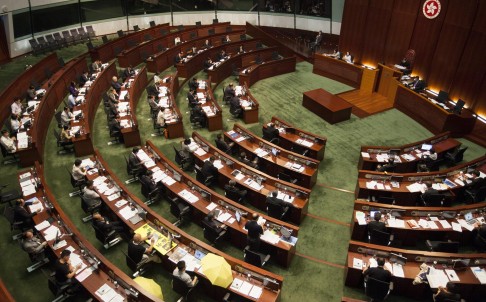
Incessant political struggle in the legislature is leading to stagnancy.
My disappointment with the August 31 decision of the Standing Committee of the National People's Congress stems from my fear that Hong Kong might have lost the chance of electing a chief executive through universal suffrage in 2017.
Hong Kong needs political reform to address two critical problems.
The first relates to the deep economic and social contradictions that have arisen here from economic globalisation and China's opening. Coherent and sustainable policies are needed to deal with these contradictions. Without political reform, there is a danger that future government policies could compromise the core values Hong Kong has depended on for its past successes.
The second problem relates to the political gridlock and open confrontation on the streets and in the legislature, which is preventing government from taking effective policy actions and compromises its ability to govern well. Incessant political struggle in the legislature is leading to stagnancy and at best a mixed bag of disparate policies approved by chance or contrivance.
Only when the head of government is accountable to the broad electorate will there be any hope that the gridlock can be broken. Only a popularly elected chief executive will have any real chance of uniting people and putting a halt to polarisation.
Waiting for 2022 or 2027 will be disastrous for Hong Kong and even more time will be lost. Reaching an agreement on the chief executive election would be a significant accomplishment because it would reflect agreement on not just an isolated issue, but also an understanding on how to take forward political reform.
I believe there is plenty of room for introducing a more democratic political arrangement even after the August 31 decision. The reformation of the legislature has hardly started.
The composition of the nominating committee for the chief executive (other than the "four sectors") and how their members are to be formed has not been touched on. There are many details still to be worked out on the design of both the nomination process and the election process. The empty spaces that need filling are large enough to make Hong Kong as democratic as the United States and Britain.
READ MORE: To view all the latest Occupy Central stories click here
The demands of the opposition to allow public nomination of the chief executive and abolish functional constituencies in the legislature are the opening bids of a radical agenda that does not necessarily command majority support even within the opposition coalition. To date, these demands have been rejected on legal grounds and not been given a political counter-argument.
But how can the negotiations move forward when trust is lacking?
A third-party platform is needed to foster such trust among the different parties. The government should appoint a commission composed of individuals of high standing, who command a high degree of legitimacy, to submit a recommendation to the government on the future of political reform.
This commission's report should incorporate a broad spectrum of the public's political aspirations, but in compliance with the constitutional requirements. Its recommendations should be made public. The commission's work should precede the next stage of the "five-step" process of Hong Kong's political reform.
The work of the commission would not be easy, but it would have the advantage of commanding the trust not only of the government and opposition, but also the central government.
Prolonged occupation of the streets is an affront to the rule of law. The occupiers have said they intend to surrender themselves to the law to take personal responsibility for their actions. This is laudable, but the real goal should be to win the hearts and minds of the people, not to defend public streets. Hong Kong does not need political confrontation to advance towards democracy, nor does mainland China. Memories of the Cultural Revolution should be put to rest.
Yet political struggle is evident here. Hong Kong should resist letting this struggle rule our political future. The development of democracy must be advanced through accommodation and consensus building, and not be dominated by the radical tendencies of the pan-democratic movement.
The Hong Kong government has a primary responsibility for completing the "five-step" process and bringing it to a resounding success for the benefit of the people of Hong Kong and for the central government.
Richard Wong Yue-chim is Philip Wong Kennedy Wong Professor in Political Economy at the University of Hong Kong.
This article appeared in the South China Morning Post print edition as Breaking the gridlock
PUBLISHED : Wednesday, 29 October, 2014, 2:08pm
UPDATED : Thursday, 30 October, 2014, 11:43am
Tung Chee-hwa and Hong Kong government's 'gloom and doom' propaganda hokum
Instead of talking up the economy, government officials and supporters are saying it will only get worse as 'umbrella' protests hit the city
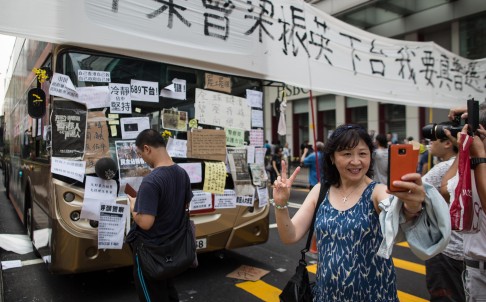
Hong Kong still a destination for mainland tours despite the unrest.
We are living in a very strange world when government officials and their backers make it their business to talk down the economy and spread despondency while government opponents studiously abstain from the gloom fest.
Yet this is precisely what is happening in Hong Kong now.
In most places, government officials do their best to talk up the economy. Even when things are really bad, they search desperately for shards of light to relieve the gloom.
However, listening to officials providing an economy commentary is a bit like identifying deep insights in Mickey Mouse comics: it is a waste of time.
Mind you, at least the dreaded Mouse provides entertainment, while government officials and politicians strut the stage for the less edifying purpose of covering their backsides and pursuing a political agenda. They play loose and fast with data and stretch its interpretation to serve less than benign interests.
This explains why, as the government faces unprecedented challenges on the streets, we see the emergence of gloom peddlers ranging from the financial secretary to various trade associations and, most prominently, former shipping tycoon Tung Chee-hwa, who was ignominiously removed from office as the city's first chief executive, being resuscitated to serve as Gloom-Spreader-in-Chief.
Last week, he said hotel bookings and credit card spending had slumped 20 to 30 per cent since the beginning of the umbrella movement protests and, obviously feeling that this declaration was insufficiently depressing, went on to say "the fall is staggering and even more worrying is that it was not a gradual drop but a sudden plunge". And, in case anyone dared harbour any sense of optimism, he warned that things were set to get worse.
No one, including Tung himself, has been able to produce the data on which these claims are based, but there are some real figures to hand that inconveniently refute these claims. For example, mainland group tours to Hong Kong rose 90 per cent from October 1 to 22, despite reports of a ban on these tours initiated by the mainland authorities in the first week of this month. That was also the week in which the number of visitor arrivals from the mainland rose almost 7 per cent from the same period last year.
We have yet to see any comprehensive retail sales data for the past month, but anecdotal evidence, backed by some reporters' legwork, shows that while retail sales have fallen in demonstration areas, other areas have put on big increases. Moreover, some businesses in these areas, especially fast-food providers, have found themselves selling out on a daily basis. Then there is the case of luxury department store Lane Crawford, which registered a 300 per cent surge in online sales during the first three weeks of the protests.
This is not to say that businesses have not been hit by the protests, but allegations of an economic slump are, to put it mildly, somewhat premature. It is therefore safe to treat the more alarmist statements for what they are: political propaganda.
And this kind of propaganda works both ways because when economies are doing well, politicians like to imply that stellar performance is somehow thanks to their shrewd management of the economy. Some go further and actually plunge into the economic maelstrom and meddle like mad in the markets. This happened in the wake of the Asian financial crisis in the late 1990s when the Tung government shed its laissez-faire beliefs and plunged into the stock market waving very large sums of taxpayers' cash. The result was an eventual market recovery, but it came at more or less the same time as the recovery in other Asian markets, which simply allowed share prices to come back at their own pace.
Those who are sordid enough to actually engage in the business of making and selling real products can look at the hyperactivity in government and its propaganda machine safe in the knowledge that this is very much a case of sound and fury signifying very little.
However, we cannot afford to be complacent because governments do have the ability to wreck business, and in the current crisis, we are seeing signs that the mainland authorities are inclined to "teach Hong Kong a lesson" by, for example, going slow on the establishment of the link between the local bourse and the Shanghai stock exchange.
READ MORE: To view all the latest Occupy Central stories click here
If there really is deliberate action under way to undermine the Hong Kong economy by the very people who are supposed to provide responsible government, the question needs to be asked: who is it that really cares about Hong Kong?
Maybe Mr Gloom-Spreader-in-Chief would care to supply an answer.
Stephen Vines runs companies in the food sector and moonlights as a journalist and a broadcaster
This article appeared in the South China Morning Post print edition as Spreading the gloom
World Bank says Occupy protests fail to impact Hong Kong's business climate
PUBLISHED : Wednesday, 29 October, 2014, 4:59pm
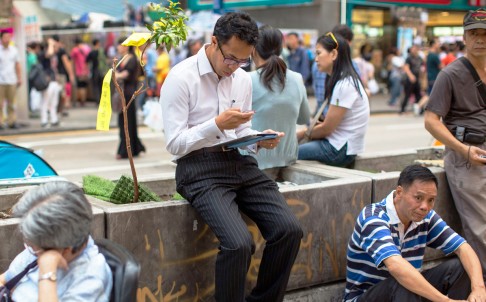
A blockaded section of Nathan Road in Mong Kok. The World Bank assesses that the pro-democracy protests have had little effect on the overall way of doing business in Hong Kong. Photo: EPA
The Occupy protests have not affected Hong Kong's business climate, says the World Bank Group, which in its annual report released yesterday rates the city as the third easiest place in the world to do business.
 "Right now, the pro-democracy campaign does not appear to have an impact on the overall business confidence," said Wendy Werner, manager for trade and competitiveness at the World Bank Group, which publishes the annual Doing Business report measuring the regulatory environment for small and medium-sized enterprises.
"Right now, the pro-democracy campaign does not appear to have an impact on the overall business confidence," said Wendy Werner, manager for trade and competitiveness at the World Bank Group, which publishes the annual Doing Business report measuring the regulatory environment for small and medium-sized enterprises.
"We have to distinguish … between the financial and economic impact of the demonstrations [and] the overall business climate," she said. "For the pro-democracy campaign to have any impact on Doing Business indicators it really [would] have to change something about the rules and regulations and their enforcement when it comes to trading, starting a business, registering property."
READ MORE: To view all the latest Occupy Central stories click here
The report - which looks at 10 indicators such as the speed and cost of obtaining credit, construction permits and paying taxes in 189 economies in the year ending in June - does not measure market stability or investor confidence.
"From what we can see here, as long as transparency is strong, there's good corporate governance rules, and we have business-friendly rules and regulations, the investment climate really should stay intact, and that seems to be the case right now [in Hong Kong]," Werner said.
Hong Kong ran second to Singapore in the previous four years as the easiest place to do business. It fell to third this year, behind New Zealand.
The World Bank Group said it introduced major changes to data sources and used a new methodology under which Hong Kong would have ranked third last year with a score lower than it got this year.
Hong Kong's scores varied significantly across the 10 indicators, said Valentina Saltane, a co-author of the report. It has improved on its protection for minority shareholders to become the world's second best because of higher disclosure standards introduced in the revised Companies Ordinance that came into effect in March.
While it is again the world's easiest place for obtaining construction permits, it ranked 96th when it came to registering property, with as many as five procedures involved. This meant it took 35.5 days to complete registration, at a cost of 7.7 per cent of the property's value. It also became more expensive to start a business because a registration fee waiver expired in April.
A Hong Kong government spokesman said in response to the report: "The government will strive to cut red tape, eliminate outdated or unnecessary regulations on business, enhance regulatory efficiency and reduce business compliance costs, with a view to further improving the ease of doing business in Hong Kong."
Mainland China has moved up three places in the rankings - to 90th - as it made it easier to start a business by eliminating minimum capital requirements.
Paying taxes has also become easier because of an improved electronic system, and companies in Shanghai pay less tax because of a reduction in social security contributions.
This article appeared in the South China Morning Post print edition as 'Occupy hasn't hit business climate'
http://www.scmp.com/topics/occupy-central
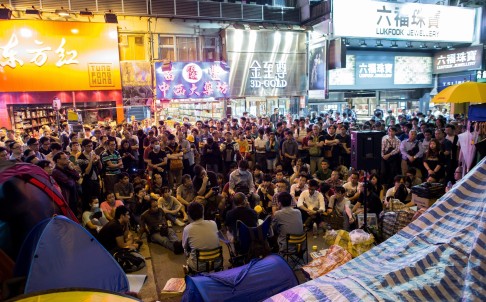
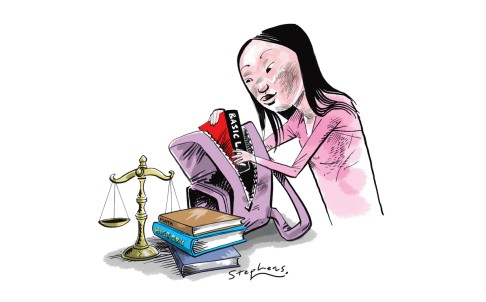
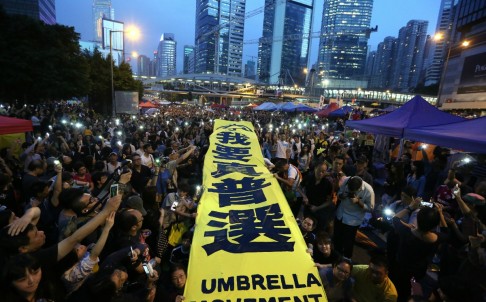

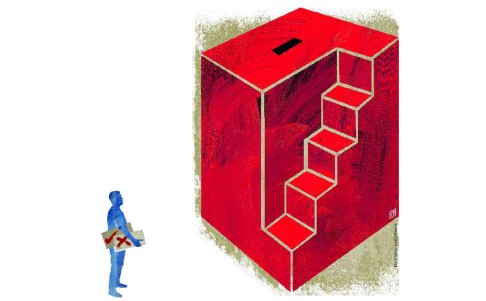


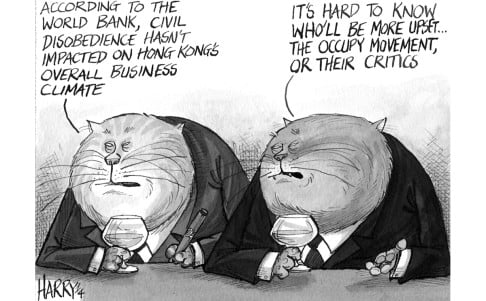
沒有留言:
張貼留言